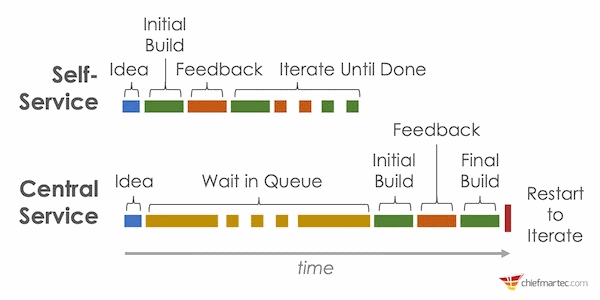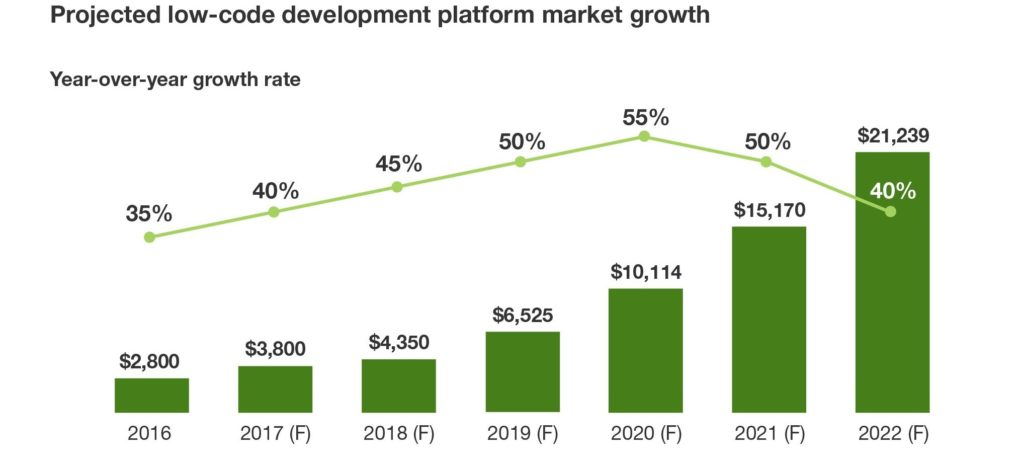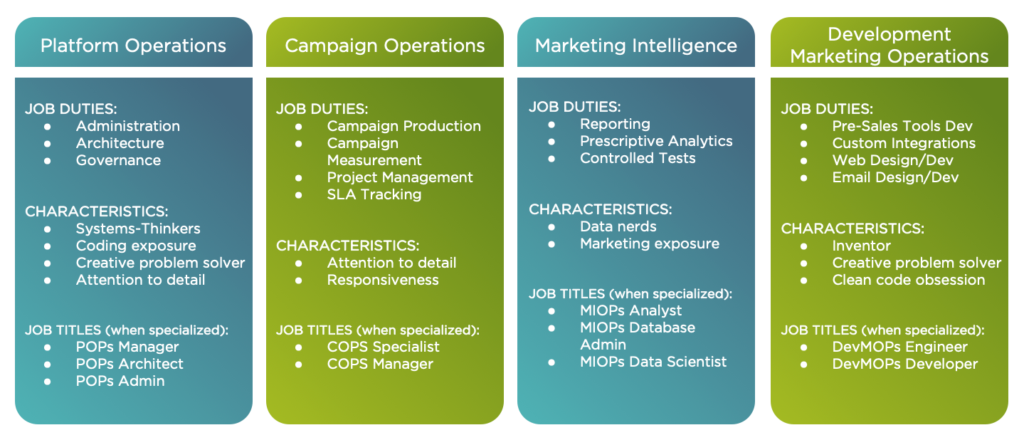Build a revenue operations team as a revenue ops leader

This article discusses best practices to build out a revenue operations team while developing your own skills as a revenue operations leader. To learn more best practices for revenue operations, marketing operations, sales operations, customer operations, and even business technology/systems, please see “The professional guide to revenue operations.”
With the incredible explosion of software-as-a-service (SaaS) applications for business, there’s an increasing need for operations professionals to manage them. Operations teams need leaders. And as you might guess, there’s more to leading operations teams than being really good at using software (though that definitely doesn’t hurt).
Taking the lead in revenue operations
Let’s first discuss the skills that set operations leads apart and help them successfully lead their teams. Much has been written about leadership and team management in general, but we’ll be focusing on skills that specifically apply to working in revenue operations roles for marketing, sales, or customer ops.
Strategic thinking - Thinking strategically helps operations leaders break free of the treadmill of fielding ad hoc, day-to-day requests from around the organization. A strategic approach means mapping technical and team needs to company goals, as well as being able to plan out and execute on budgets, timetables, and staffing for specific projects.
Example: If a company’s goal is to significantly increase top-of-funnel leads next year, revenue operations leaders may look to grow their MarTech stack with additional technology to drive awareness and leads, such as SEO analytics, paid search optimization, or conversion rate optimization (CRO) tools. Tactical planning for this project will break down to budget estimates, tool evaluations, finding product owners, procurement, and driving adoption through enablement. Strategic thinking also encompasses the essential abilities of goal-setting (for both operations leaders and their team’s careers) and prioritizing projects ruthlessly. Fortunately, there’s something that can help with that.
Analytical thinking - Thinking in terms of metrics helps operations leaders clearly justify budgets and projects. Operations professionals get clarity on prioritizing their to-do lists by viewing them through the lens of potential business value for each project, compared against potential costs and work hours required to implement. Being able to think and communicate in terms of metrics and business value also helps operations leads advocate more strongly for team support and executive sponsorship on key projects and budgets.
Communications skills - Being able to clearly communicate is essential for operations leaders for many reasons. Obviously, as a team lead, revenue operations leaders benefit from strong communication skills to keep their team members aligned with clear expectations and ongoing support. In addition, managing a company’s tech stack is a responsibility that can be both highly technical and seem more than a little arcane for other busy team members, who may only want to hear about what’s in it for them. Ideally, operations leaders need to be able to distill complicated technical and business concepts into simplified talking points that anyone can understand. A best practice for communicating revenue operations topics is tying specific concepts to business value points that matter to the audience.
Example: It’ll probably be hard to get your marketing VP’s attention by complaining about how your current marketing platform handles your marketing database poorly. It’ll be much easier to get their attention by pointing out that more than 50% of online customers switch brands without personalized marketing messaging, while tying it to the increase in unsubscribe rates you’ve noticed this quarter. (And if you can follow up with a clear plan to fix the issue by replacing it with a marketing platform and other tools that will provide a stronger fit for your use case within budget, you’re well on your way to not just continuing a conversation, but leading actual change!)
Consensus building - While it’s easy to think of revenue operations as being about caretaking software, launching larger operations initiatives is a team sport that requires participation from multiple stakeholders, which might include IT procurement, legal, InfoSec, and budget owners, among others. Driving adoption for newly-acquired technology requires building consensus around technical users and product champions to ensure team members actually use the expensive new software you spent months tracking down, evaluating, and finally implementing. In all cases, it’s important to be able to bring different stakeholders together to support and push group projects across the finish line.
Creative problem-solving - In a perfect world, everyone would get exactly what they want, exactly when we need it. Revenue operations professionals know they don’t live in a perfect world. They don’t always get the budget they requested for the technology they absolutely needed within the timeframe they specified. In addition, out-of-the-box software may not do everything they need, particularly in the face of unexpected, 11th-hour requests. Operations leaders benefit greatly from the ability to think on their feet and devise efficient solutions and processes that require minimal lift from themselves and their teams while hitting their objectives.
Enablement and education - As de facto technology leads sitting outside of IT, revenue operations are also de facto thought leaders. They hold the keys to the tech stack kingdom, so it’s common for organizations to expect them to be subject matter experts (and unfortunately, in-house tech support). Being able to rapidly enable team members to relieve their technology-related pain (or quickly refer them to someone who can) may seem like the hallmark of a good revenue ops leader. However, great revenue operations leads provide sufficient training and enablement materials so that team members can self-serve. By removing themselves as bottlenecks in the process, great revenue ops leaders empower their teams to execute faster, iterate faster, and scale faster.

Smart revenue ops leaders enable their teams to self-serve, removing themselves as bottlenecks. Image courtesy ChiefMarTec
Technical proficiency for revenue ops leadership
It’s no secret that revenue operations as a discipline is becoming more technical. It’s increasingly common for companies to expect leaders in marketing operations, sales operations, customer operations, and business systems to understand and diagnose the more-technical details of their tech stack.
Some operations professionals have already chosen to dive into the world of coding, learning languages such as SQL to run database queries for marketing analytics or Javascript to set up web tracking with Google Tag Manager and other web-based tools. However, new developments in business software suggest an alternate path to accomplishing software-related tasks. Here are some specific trends and technical topics for revenue operations professionals to explore to expand their domain expertise and better position themselves as leaders:
APIs - One way to think of an application programming interfaces (APIs) is as a wrapper or container for software, used to deliver the software and its data. When different software applications interact with each other, such as passing data among themselves, they do so at the API level. (To learn more about APIs, see our article, “How do APIs work?”)
API integrations - API integrations - The most common way that software shares data is by way of an API integration - an API-level connection between different software applications. While different software products frequently pass data among themselves by way of API integrations that exist in as pre-built, native integrations between those services, it’s also common for software applications to “talk to” each other via alternate means. (To learn more about API integrations, see our full guide, “What are API integrations?”)
Webhooks - Webhooks are an alternate means by which software can pass data, even without a natively-built integration.
Low-code - So-called “low-code” solutions now allow less-technical business users to build software solutions without writing a single line of code. This new category of software is growing rapidly.
Low-code automation platforms - Low-code automation platforms combine all of the above in a single, easy-to-use package. By offering a low-code environment, they empower revenue operations leaders to directly connect software applications at the API level (as well as via webhooks and additional means such as HTTP and FTP). Low-code automation platforms also give revenue ops leaders the ability to orchestrate complex processes among different applications with automation, such as managing the entire lead lifecycle, order-to-cash, and new customer onboarding.

Low-code development is already a multi-billion-dollar market that grew to $20B+ in 2022. Image courtesy Forrester.Hiring a revenue ops team
We’ve covered process and we’ve covered technology, but in order to truly become a proficient revenue operations leader, it’s important to understand how to manage people. Working in operations carries its own set of unique challenges, which tend to favor certain approaches, and in some cases, certain personality types.
Hiring for proficiency - The first question most teams ask when seeking a new revenue operations hire is whether candidates have the technical chops. Many teams use tried-and-true tactics such as take-home or onsite tests and probing interview questions. This is obvious, standard-issue stuff, and depending on your team’s situation, may be mandatory to cover software usage and problem-solving.
Hiring for learning potential and curiosity - The first question most revenue operations leaders ask when seeking new hires is whether candidates have the ability to learn. One indicator is a growing list of software and technical proficiencies that should have accrued on your candidates’ resumes over time. Another key indicator is the way candidates express their natural curiosity and propensity to learn, such as through any courses they’re currently taking or have recently completed, or any professional communities they’ve taken the initiative to join. There is also, of course, something of an X-factor you’ll learn about when speaking directly with candidates for the first time. Revenue operations leaders tend to look for active curiosity in candidates and engage them with open-ended interview questions (that can’t be answered with a simple “yes” or “no”) that don’t necessarily have “right” answers, but give candidates the opportunity to ask follow-up questions.
Hiring for an operations mindset - We’ve covered the most important skills for revenue operations leaders above. Team members ideally evince many of the same characteristics, and are solutions-focused collaborators who are expert problem-solvers. However, for better or worse, revenue operations team members generally aren’t the focus of a company’s attention. Unless, of course, something’s broken. When building out a revenue operations team, it’s important to be realistic about the level of visibility a revops team generally receives. Revenue operations professionals understand that it’s OK to be an “unsung hero.” Revops leaders understand the importance of recognizing their team’s efforts and achievements in ways that are most appropriate for each team member.
Revenue operations team org structure
At many rapidly-growing companies, it’s common for revenue operations teams to be shorthanded. (At smaller startups, revenue ops pros are frequently an army of one.) But over time, as revenue operations teams grow, it may make sense to specialize team members into specific functions to expedite processes. Next, we’ll discuss a potential org structure for a developing revenue ops team. The list is provided in approximate order of team growth/hiring - over time, as your revenue operations needs expand, you may wish to consider addition new roles in this order.
Disclaimer: Obviously, there’s no one-size-fits-all, perfect way to develop a revenue ops team along roles and tool ownership. Every organization will have its own unique business needs. The following is intended to be a guideline, not a set of hard-and-fast rules.
Team lead - The de facto tech stack subject matter expert and frequently the first point of contact with the rest of the organization. Revenue operations team leaders ensure their team is working in alignment with company goals, and keep everyone on target. Team leads can also act as all-rounders who provide other vital functions such as taking ownership of performance metrics and delivering analytics to executive teams. They may also act as project managers to protect their teams from being distracted by ad hoc requests by filtering and prioritizing.
Platform team - Over time, revenue ops leaders may wish to hand over the proverbial keys to the kingdom - that is, administrator and governance duties for the software in your tech stack - to other team members. While team leads should remain in the loop about technology developments (such as cancelations, renewals, or need for new acquisitions), it may make sense to delegate day-to-day ownership of actual software to other team members, particularly for software applications that either see a high volume of external requests (such as sales reports for a CRM) or are potentially high-maintenance (such as due to technical or security-related issues that are exceptionally time-consuming).
Analytics team - As your team and data needs scale, it may make sense to delegate performance metrics and data visualization. While performance metrics are important to keep your revenue ops team (and your entire company) moving in the right direction, they can be extremely time-consuming to generate. Many modern business applications generate metrics in silos that keep data separate, which means that creating aggregate reports can frequently boil down to hours of manual busywork logging into multiple platforms to copy-paste data from one location to another. Breaking analytics into a dedicated team may make particular sense for companies that require frequent reports.
NOTE: It may be worth mentioning that some revenue operations teams use GAPs to automate analytics processes. For example, this article covers how to automate marketing analytics.
Project management - On any given day, revenue operations teams tend to have many important tasks in their queue. However, they also work collaboratively with many other teams across their organizations, and constantly receive ad hoc requests for technical assistance, reporting, strategy, and many other topics. Any single request could take your team sideways, so it’s incredibly helpful to productivity to have a separate team member on hand to filter and prioritize these requests as they pop up. As a revenue operations team lead, you’ll likely start out being the gatekeeper, but over time, it may make sense for you to delegate this important duty as well.

One potential org structure for marketing operations divvies up platform ownership, analytics, campaigns, and R&D. Image courtesy Etumos.
Takeaways
Hopefully, you have some ideas on the types of skills and technical trends to follow to develop your own career as a revenue operations leader, as well as what to look for as you hire a team. For more actionable tips on professional development and tech stack management, please see these additional resources: